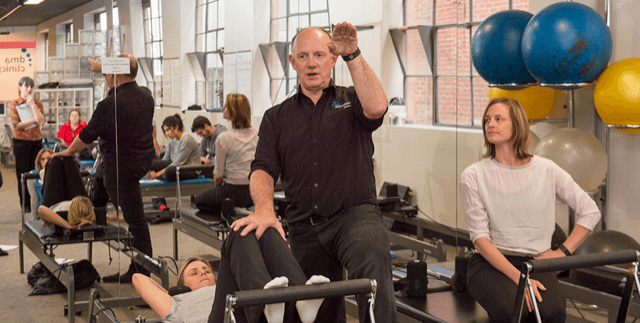
Physios on Pilates reform – Craig Phillips

Craig Phillips
APA Sports and Exercise Physiotherapist
Melbourne-based sports physiotherapist and Pilates expert Craig Phillips says PHI natural therapy reforms will have little impact on practices treating patients with chronic long-term conditions.
Can you explain how you use Pilates in your clinic and if that will change as a result of the reforms?
The way we use Pilates will not change at all because it’s a treatment regime. We treat the patient individually then move them into program-based management where four patients are treated at the same time with individualised programs and then finally a maintenance stage. As you would with any physio it’s suitability of manual therapy versus exercise-based therapy, which we know is highly effective. If exercise therapy is deemed applicable they will be moved into an exercise-based program of which Pilates is merely a brand.
What are you doing to prepare for the changes?
Running of sessions
Our sessions won’t change. We have always been compliant through assessment, intervention, reassessment and accurate outcome measures after every session. We have also developed software that will comply with the treatment or program. It prints out treatment notes with the program and measures, which then can morph into their maintenance phase, once the rebate has been used up. Each treatment is individualised based on the exercise selection criteria.
Session names
Physio co-treatment program if there’s a rebate. Once the rebate is used it will be called clinical Pilates. Most of my patients have chronic conditions and their rebates are used up during the initial one-on-one treatment stage.
Pilates name
We have built up our reputation over 30 years and our brand is trusted and recognised. It won’t change.
Clinical notes
The key to compliance is note taking. We have never referred to Pilates in our notes. Our treatment is physio and Pilates is one more tool that we’re using.
Patient communication
We’ve sent out emails to our patients and we have told them not to be concerned about the name change. We tell them this is physio and their treatment is the same.
How have patients reacted to the changes?
They are very cross with the private health insurers. So it’s an opportunity to educate patients on several levels. I don’t think I’ve lost any patients [because of the reforms] because of loyalty, brand name and the fact that a large cohort of my patients have chronic conditions.
Anything else you’d like to add?
Pilates [reform] is not the be all and end all. It’s a blip in the radar. It’s a catalyst for physios to prove their worth and show we can generate massive cost benefit by diverting patients away from unnecessary surgery and hospitalisation. We also need to document our effectiveness in preventing surgeries. Private health insurance makes up a small part of my business. The reform doesn’t affect compensables, DVA and other bodies who really don’t care about it.
Read more about the PHI natural therapies reform and how they will affect your practice here.
